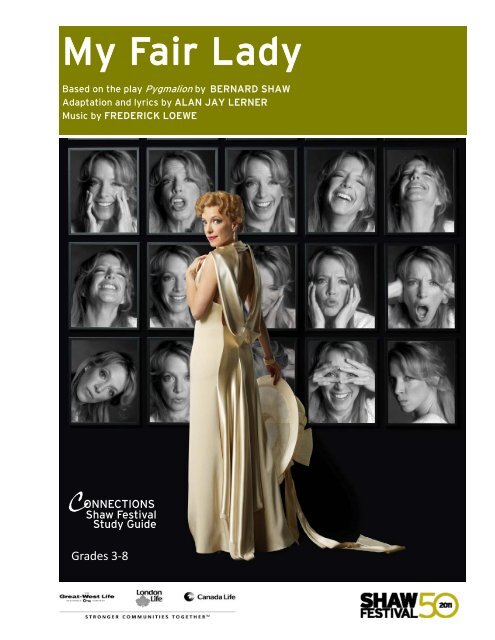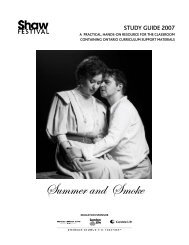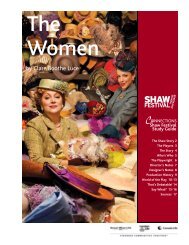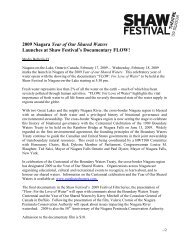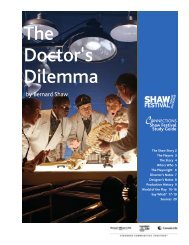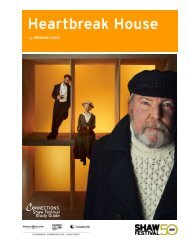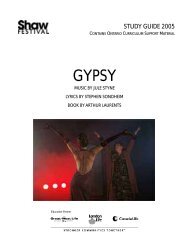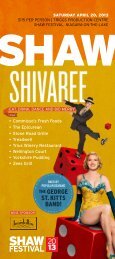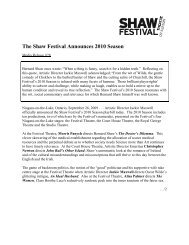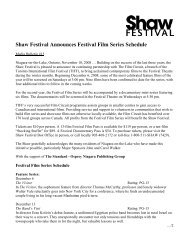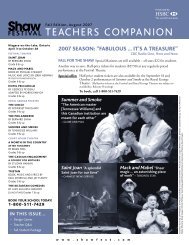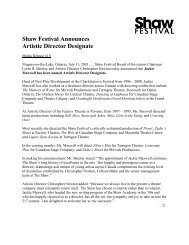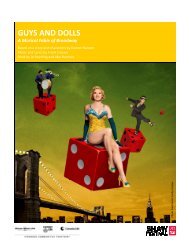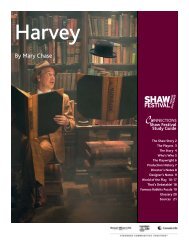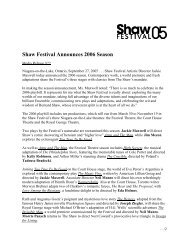My Fair Lady (elementary) - Shaw Festival Theatre
My Fair Lady (elementary) - Shaw Festival Theatre
My Fair Lady (elementary) - Shaw Festival Theatre
You also want an ePaper? Increase the reach of your titles
YUMPU automatically turns print PDFs into web optimized ePapers that Google loves.
<strong>My</strong> <strong>Fair</strong> <strong>Lady</strong><br />
Based on the play Pygmalion by BERNARD SHAW<br />
Adaptation and lyrics by ALAN JAY LERNER<br />
Music by FREDERICK LOEWE<br />
C ONNECTIONS<br />
<strong>Shaw</strong> <strong>Festival</strong><br />
Study Guide<br />
Grades 3‐8
WHAT MAKES<br />
SHAW SPECIAL<br />
<strong>Festival</strong> <strong>Theatre</strong><br />
Court House <strong>Theatre</strong><br />
Royal George <strong>Theatre</strong><br />
MANDATE<br />
THE SHAW STORY<br />
The <strong>Shaw</strong> <strong>Festival</strong> produces and presents the work of George Bernard<br />
<strong>Shaw</strong> (1856-1950) and playwrights writing anywhere in the world during, or<br />
about, the era of <strong>Shaw</strong>’s lifetime.<br />
VALUES<br />
• The <strong>Shaw</strong> <strong>Festival</strong> chooses works for presentation that are challenging,<br />
provocative and intelligent.<br />
• Productions engage audiences with clever, insightful, and delightful portraits<br />
of the human condition.<br />
• The works chosen often resonate with the wit, social commentary, and<br />
topical relevance for which G.B. <strong>Shaw</strong> himself was well known.<br />
• The <strong>Shaw</strong> <strong>Festival</strong> is dedicated to excellence, consistency, and integrity<br />
in all its creative and administrative practices.<br />
• The <strong>Shaw</strong> <strong>Festival</strong> operates within a fiscally responsible and accountable<br />
framework.<br />
THE SHAW FESTIVAL ATTRIBUTES ITS SUCCESS TO:<br />
The Ensemble - their talent, continuity, generosity, and collegiality fuel<br />
all of the <strong>Festival</strong>’s efforts<br />
The Company - their singular sense of purpose fosters mutual trust, respect,<br />
and dedication to the <strong>Festival</strong><br />
The Repertory - the alternating schedule of performance serves the audience<br />
and inspires the company<br />
The Mandate - 1856-1950 offers a wealth of material to fascinate and delight,<br />
liberating the ensemble to explore complex questions from the safety<br />
of the not too distant past while encouraging audiences to re-discover<br />
themselves through the lens of historical perspective<br />
The <strong>Shaw</strong> <strong>Festival</strong> is a crucible of progressive and provocative ideas<br />
inspired by the brilliance, bravery, humanity, and humour of<br />
George Bernard <strong>Shaw</strong>.<br />
OUR THEATRES<br />
The <strong>Shaw</strong> <strong>Festival</strong> presents plays in four distinctive theatres. The <strong>Festival</strong><br />
<strong>Theatre</strong> with 869 seats is The <strong>Shaw</strong>’s flagship theatre; the historic Court<br />
House where The <strong>Shaw</strong> first began performing seats 327; and the Royal<br />
George <strong>Theatre</strong>, modeled after an Edwardian opera house, holds 328. Our<br />
new Studio <strong>Theatre</strong> has flexible seating and can accommodate approximately<br />
200 seats.<br />
THE SHAW’S COAT OF ARMS<br />
In 1987, on the occasion of our 25th Anniversary, the <strong>Shaw</strong> <strong>Festival</strong><br />
became the second theatre company in the world to be<br />
granted a Coat of Arms by the College of Heralds. A large<br />
painted sculpture of our Coat of Arms adorns the lobby of the<br />
<strong>Festival</strong> <strong>Theatre</strong>.<br />
C ONNECTIONS<br />
2<br />
<strong>Shaw</strong> <strong>Festival</strong> Study Guide
C ONNECTIONS<br />
Study Guide<br />
A practical, handson<br />
resource for<br />
the classroom<br />
which contains<br />
background<br />
information for the<br />
play, as well as<br />
suggested themes<br />
for classroom<br />
discussions.<br />
<strong>My</strong> <strong>Fair</strong> <strong>Lady</strong> is<br />
recommended for<br />
students in grade<br />
3 and higher.<br />
This guide was<br />
written and<br />
compiled by<br />
Megan Gilchrist<br />
and Suzanne<br />
Merriam.<br />
Additional<br />
materials were<br />
provided by Molly<br />
Smith, Paul<br />
Sportelli, Ken<br />
MacDonald, Judith<br />
Bowden, Amanda<br />
Tripp, Joanna<br />
Falck, Carly<br />
Commerford and<br />
Leonard Conolly.<br />
Cover:<br />
Deborah Hay<br />
Photo by: Shin<br />
Sugino<br />
Previews: April 13<br />
Opens: May 28<br />
Closes: October 30<br />
THE PLAYERS<br />
Eliza Doolittle DEBORAH HAY<br />
Freddy Eynsford-Hill MARK UHRE<br />
Mrs Eynsford-Hill / Cockney GABRIELLE JONES<br />
Colonel Pickering PATRICK GALLIGAN<br />
Jamie BILLY LAKE<br />
Busker / <strong>Lady</strong> Boxington KIERA SANGSTER<br />
Bootblack / Charles / Policeman COLIN LEPAGE<br />
Cockney Quartet /Butler /<br />
Dr Themistocles Stephanos KELLY WONG<br />
Henry Higgins BENEDICT CAMPBELL<br />
Cockney Quartet / Footman /<br />
Sir Reginald Tarrington LOUIE ROSSETTI<br />
Cockney Quartet / Consort /<br />
Zoltan Karpathy JEFF IRVING<br />
George / Footman ANTHONY MALARKY<br />
Alfred Doolittle NEIL BARCLAY<br />
Harry / Lord Boxington KYLE BLAIR<br />
Tart / Embassy Guest / Maid MELANIE PHILLIPSON (until June 1)<br />
MELANIE JANZEN (after June 1)<br />
Busker / Angry Man DEVON TULLOCK<br />
Mrs Pearce / Queen of Transylvania PATTY JAMIESON<br />
Tart / Maid / <strong>Lady</strong> Tarrington ROBIN EVAN WILLIS<br />
Flower Girl / Maid SACCHA DENNIS<br />
Mrs Higgins SHARRY FLETT<br />
Street Sweep / Maid HEATHER McGUIGAN<br />
Flower Girl / Swing KATIE MURPHY<br />
Flower Girl JACQUELINE THAIR<br />
Cockney / Swing KELLAN ZIFFLE<br />
Buskers ALEXANDRE BRILLON<br />
CELESTE BRILLON<br />
AIDAN TYE<br />
LUKA VUJIC<br />
THE ARTISTIC TEAM<br />
Director MOLLY SMITH<br />
Musical Director PAUL SPORTELLI<br />
Choreographer DANNY PELZIG<br />
Set Designer KEN MACDONALD<br />
Costume Designer JUDITH BOWDEN<br />
Lighting Designer JOCK MUNRO<br />
Projection Designer ADAM LARSEN<br />
Sound Designer JOHN LOTT<br />
C ONNECTIONS<br />
3<br />
<strong>Shaw</strong> <strong>Festival</strong> Study Guide
“ The<br />
difference<br />
between a<br />
lady and a<br />
flower girl<br />
is not how<br />
she<br />
behaves,<br />
but how<br />
she is<br />
treated.<br />
‐Eliza Doolittle<br />
<strong>My</strong> <strong>Fair</strong> <strong>Lady</strong><br />
The Story ”<br />
MY FAIR LADY is a story about...<br />
...the transformation of Eliza Doolittle from a dirty, uncouth Cockney flower<br />
seller into an elegant, well-spoken lady.<br />
Professor Henry Higgins, a speech scientist can place any person by their<br />
accent to within two streets of where they were born. One night outside<br />
the Royal Opera House in London, Professor Higgins and a fellow speech<br />
expert, Colonel Pickering, hear the ear-splitting howls of a flower seller<br />
whose basket of flowers has been knocked to the ground. Higgins is<br />
horrified by her language and speech and tells Colonel Pickering that if<br />
Eliza could simply learn to speak proper English, he could pass her off as a<br />
duchess at an Embassy ball within six months. While Higgins says it<br />
jokingly, Eliza hears this proposition and seizes her chance. The next day,<br />
she arrives at Higgins’ home and says she’ll pay for lessons to learn proper<br />
English so she can work in a flower shop. Pickering then challenges<br />
Higgins to deliver on his boast and Higgins accepts claiming, "I’ll make a<br />
duchess of this draggle-tailed guttersnipe!" Eliza moves in and the<br />
transformation - both inside and out - for both Eliza and Higgins begins.<br />
Higgins puts Eliza through a series of exhausting and degrading exercises<br />
to improve her speech. Eliza’s spirit is almost broken by his heartless<br />
attitude towards her, and her first public test of her skills, as the Ascot<br />
Racecourse, nearly ends in disaster as she slips back into her uncouth<br />
manner of speech.<br />
However, with the encouragement of Pickering and Mrs. Higgins, Eliza’s<br />
next presentation to high society is a complete success. At the Embassy<br />
Ball, her manners are impeccable, her speech is proper, and everyone at<br />
the Ball is completely convinced by her performance. Afterwards, Higgins<br />
celebrates “his” success at winning the bet, but continues his lack of<br />
recognition for Eliza - she has served her purpose, and he seemingly is now<br />
done with her.<br />
Eliza, who has learned self-respect from Mrs Higgins and Colonel Pickering,<br />
walks out on Higgins, and it is at that moment he realizes that he has come<br />
to care deeply for her. As he contemplates life without Eliza, the play ends<br />
with her return and they meet as equals - both having undergone transformations.<br />
C ONNECTIONS<br />
4<br />
<strong>Shaw</strong> <strong>Festival</strong> Study Guide
ELIZA DOOLITTLE<br />
A Cockney flower girl with an appalling<br />
accent and an ambition to become a<br />
sales-lady in a florist shop. She asks the<br />
famous phonetician Henry Higgins to<br />
teach her to talk and act like a lady so<br />
that she can improve her station in life.<br />
ALFRED DOOLITTLE<br />
Eliza’s father. He is a proud<br />
member of the ’undeserving poor’, a<br />
layabout and a heavy drinker. He<br />
visits Higgins to collect payment<br />
for the possession of his daughter.<br />
OO’S OO?<br />
(WHO’S WHO?)<br />
<strong>My</strong> <strong>Fair</strong> <strong>Lady</strong><br />
HENRY HIGGINS<br />
An upper class bachelor and phonetics<br />
expert who wagers that in six months he<br />
could pass Eliza off as a duchess at an<br />
Embassy ball or get her a place as a<br />
lady’s maid or shop assistant.<br />
FREDDY EYNSFORD-HILL<br />
An upper class but penniless<br />
young man who falls desperately<br />
in love with Eliza Doolittle after<br />
she is transformed from a flower<br />
girl into a lady.<br />
© The Al Hirschfeld Foundation. All rights reserved. www.AlHirschfeldFoundation.org<br />
COLONEL<br />
PICKERING<br />
An expert on<br />
Indian dialects<br />
visiting London to<br />
meet Henry<br />
Higgins. He<br />
assists in Eliza’s<br />
transformation.<br />
MRS HIGGINS<br />
Henry’s mother.<br />
She is the first to<br />
test Eliza as a<br />
lady.<br />
MRS EYNSFORD-<br />
HILL<br />
Friends with Mrs<br />
Higgins and<br />
mother of Freddy.<br />
MRS PEARCE<br />
Henry Higgins’<br />
housekeeper<br />
C ONNECTIONS<br />
5<br />
<strong>Shaw</strong> <strong>Festival</strong> Study Guide
the<br />
eaine<br />
e,<br />
you<br />
t last<br />
at<br />
SHAW THE VEGETARIAN<br />
“Meat is poison to the<br />
system. No one should live<br />
on dead things.”<br />
He believed this to be the<br />
reason he stayed mentally<br />
and physically fit into his<br />
90s.<br />
The Playwright<br />
SHAW THE LOVER<br />
GBS loved women. He had<br />
life-long affairs with many,<br />
in letters, poetry, and<br />
prose but rarely of the<br />
flesh. He was a major<br />
supporter of women’s<br />
emancipation.<br />
“She is the slave of duty.”<br />
The Playwright<br />
Bernard <strong>Shaw</strong><br />
SHAW THE BOY<br />
“I may add that I was incorrigibly idle and worthless as a schoolboy, and<br />
am proud of the fact.”<br />
But his bedtime reading consisted of the entire works of the entire works<br />
of Dickens and Shakespeare.<br />
SHAW THE REBEL<br />
“Do not do unto others as you expect they should<br />
do unto you. Their tastes may not be the same.”<br />
<strong>Shaw</strong> championed equity for those who had no<br />
voice in society - the underprivileged and women.<br />
SHAW THE SOCIALIST<br />
“Socialism is … the economist’s hatred of waste and<br />
disorder, the aesthete's hatred of ugliness and dirt,<br />
the lawyer’s hatred of injustice, the doctor's hatred<br />
of disease, the saint's hatred of the seven deadly<br />
sins.”<br />
<strong>Shaw</strong> believed in activism. Intellect and words<br />
were his weapons.<br />
SHAW THE SUPERMAN<br />
<strong>Shaw</strong> was interested in everything, had an opinion on everything,<br />
and criticized everything. No thought went unrecorded<br />
or unexpressed. The personal letters he wrote in his<br />
lifetime compose five large volumes. He wrote reviews,<br />
articles, essays , 55 plays and introduced a new adjective<br />
into the English language - Shavian - a term used to describe<br />
all his brilliant qualities.<br />
C ONNECTIONS<br />
6<br />
<strong>Shaw</strong> <strong>Festival</strong> Study Guide
“ They<br />
(Lerner and<br />
Loewe)<br />
have drawn<br />
song out of<br />
<strong>Shaw</strong>’s<br />
people, not<br />
imposed it<br />
on them.<br />
”<br />
Kenneth Tynan<br />
<strong>Theatre</strong> Critic<br />
From <strong>My</strong>th to Musical<br />
First A <strong>My</strong>th ...<br />
~ Roman poet Ovid wrote a myth about a sculptor<br />
named Pygmalion who created a statue of a beautiful<br />
woman named Galatea. He prayed to the goddess<br />
Aphrodite to bring his statue to life. She granted his<br />
request and Pygmalion and Galatea married and<br />
enjoyed a long and happy marriage.<br />
Then A Play ...<br />
~ Bernard <strong>Shaw</strong> wrote a play called Pygmalion, about<br />
Henry Higgins, a linguistic scientist who takes a bet to<br />
transform Eliza Doolittle, a Cockney flower seller into a<br />
duchess. Higgins teaches Eliza how to speak and behave<br />
properly and wins the bet. Even though Eliza’s new<br />
education has left her unsuitable to return to flower<br />
selling she leaves Higgins in search of a new life.<br />
Then A Film ...<br />
~ Pygmalion was the first of <strong>Shaw</strong>’s works to be adapted<br />
for the screen. Against <strong>Shaw</strong>’s wishes, a “romantic<br />
ending” was added, with Eliza returning to Higgins.<br />
However, the film version did retain the highly<br />
controversial line from the play “Not bloody likely”,<br />
which was considered a “swear word” at the time.<br />
Then A Stage Musical …<br />
~ Alan Jay Lerner and Fritz Loewe created the musical<br />
<strong>My</strong> <strong>Fair</strong> <strong>Lady</strong> which opened on Broadway in 1965 and ran<br />
for 2,717 performances - a record at that time. The<br />
original Broadway cast recording of <strong>My</strong> <strong>Fair</strong> <strong>Lady</strong> spent<br />
480 weeks on the Billboard charts, making it the thirdlongest<br />
selling album of all time.<br />
And Again a Film ...<br />
~ <strong>My</strong> <strong>Fair</strong> <strong>Lady</strong> was made into a film in 1964 starring<br />
Rex Harrison and Audrey Hepburn. The film won eight<br />
Oscars. Some of the many modern takes on the <strong>My</strong><br />
<strong>Fair</strong> <strong>Lady</strong> story include episodes of The Simpsons and<br />
The Family Guy, as well as the 1999 film She’s All<br />
That.<br />
C ONNECTIONS<br />
7<br />
<strong>Shaw</strong> <strong>Festival</strong> Study Guide
Did You<br />
Know...<br />
In 2010, the<br />
<strong>Shaw</strong> <strong>Festival</strong><br />
supported the<br />
equivalent of<br />
1,107 full-year<br />
jobs, and the<br />
total economic<br />
impact of the<br />
<strong>Festival</strong> is<br />
estimated at<br />
$75.4M!<br />
WHO’S WHO IN THE THEATRE<br />
<strong>Theatre</strong> is all about teamwork.<br />
Here’s a list of some of the many people it takes to create live theatre.<br />
Careers in Creative<br />
⇒ Artistic Director<br />
⇒ Director<br />
◊ Intern Director<br />
⇒ Actor<br />
◊ Acting<br />
Apprentice<br />
◊<br />
⇒ Design<br />
◊ Lighting<br />
◊ Set<br />
◊ Costume<br />
◊ Sound<br />
◊ Video/Projection<br />
⇒ Planning Director<br />
⇒ Music<br />
◊ Director/<br />
Conductor<br />
◊ Composer<br />
◊ Music Intern<br />
◊ Accompanist<br />
◊ Singing Coach<br />
⇒ Playwright<br />
⇒ Literary Manager<br />
⇒ Choreographer<br />
◊ Dance Captain<br />
⇒ Publications Coordinator<br />
⇒ Speech and Dialect<br />
Coaches<br />
⇒ Arts Educator<br />
⇒ Alexander Technique<br />
Coach<br />
⇒ Dramaturg<br />
Careers in<br />
Administration<br />
⇒ Executive Director<br />
⇒ Executive Assistant<br />
⇒ Human Resources<br />
⇒ Development<br />
◊ Fundraiser<br />
◊ Researcher<br />
◊ Customer<br />
Relations<br />
⇒ Information Services<br />
◊ Database Analyst<br />
◊ IT Specialist<br />
◊ Receptionist<br />
⇒ Marketing<br />
⇒ Finance<br />
◊ Accountant<br />
◊ Bookkeeper<br />
◊ Payroll<br />
Coordinator<br />
⇒ Audience Services<br />
◊ Food & Beverage<br />
Staff<br />
◊ Ushers<br />
⇒ Facilities<br />
◊ Housekeeping<br />
◊ Maintenance<br />
◊ Security<br />
◊ Groundskeeper<br />
⇒ Distribution<br />
◊ Printing Press<br />
Operator<br />
◊ Mailroom<br />
Coordinator<br />
⇒ Sales<br />
◊ Box Office<br />
◊ Green Room<br />
◊ Retail<br />
⇒ Public Relations<br />
⇒ Housing<br />
◊ Maintenance<br />
* Check out Who’s Who crossword puzzle on page 29 *<br />
Careers in Production<br />
⇒ Stage Management<br />
◊ Stage Manager<br />
◊ Assistant Stage<br />
Manager<br />
◊ Apprentice<br />
⇒ Props<br />
◊ Buyer<br />
◊ Builder<br />
◊ Driver<br />
⇒ Wardrobe<br />
◊ Buyer<br />
◊ Milliner<br />
◊ Accessorist<br />
◊ Boots/Shoes<br />
◊ Cutter<br />
◊ Taylor<br />
◊ Sewer<br />
◊ Dyer<br />
◊ Wardrobe Running<br />
⇒ Scenic Art<br />
◊ Painter<br />
⇒ Scenery Construction<br />
◊ Carpenter<br />
◊ Welder<br />
◊ Machinist<br />
◊ Drafter<br />
⇒ Audio<br />
◊ Sound Operators/<br />
Engineers<br />
⇒ Technical Director<br />
⇒ Electrics<br />
⇒ Stage Crew<br />
◊ Stage Carpenter<br />
◊ Stage Hand<br />
◊ Flyperson<br />
◊ Stage Crew<br />
◊ Changeover Crew<br />
⇒ Wigs<br />
◊ Wigmaker<br />
◊ Hair Stylist<br />
◊ Make-up<br />
C ONNECTIONS<br />
8<br />
<strong>Shaw</strong> <strong>Festival</strong> Study Guide
“<br />
In Act<br />
I<br />
Higgins tames<br />
Eliza; in Act II,<br />
she<br />
tames<br />
”<br />
him.<br />
”<br />
Molly Smith,<br />
Director<br />
<strong>My</strong> <strong>Fair</strong> <strong>Lady</strong><br />
Jobs in <strong>Theatre</strong>:<br />
The Director<br />
MOLLY SMITH talks about<br />
directing <strong>My</strong> <strong>Fair</strong> <strong>Lady</strong><br />
The Director is in charge of everything that<br />
happens onstage. They guide the cast and<br />
crew towards the goal of creating the best<br />
production possible. Here is what Molly<br />
Smith, the director of <strong>My</strong> <strong>Fair</strong> <strong>Lady</strong>, has to say<br />
about the show:<br />
Inspired by Ovid’s classical myth of transformation in which the sculptor<br />
Pygmalion creates a beautiful ivory statue of a woman named Galatea and<br />
then falls in love with her, our story is about the transformation of a<br />
human being through language, manners, mind and dress. It is a doubleheaded<br />
transformation because both Eliza and Higgins are transformed. It<br />
is the story of emancipation – not just about Eliza, but Higgins as he moves<br />
into his own humanity.<br />
The other story is about class – and the rigid social structures which<br />
confine us. In a world increasingly blown apart by the dynamics of the very<br />
rich and the very poor, this musical hits the sweet spot of our<br />
contemporary awareness of class.<br />
It asks the question: How does language define us? How do we judge<br />
others through their language, manners and dress? How does our own<br />
class: lower, middle, upper, confine and define us? Ken McDonald’s<br />
beautiful set design and Judith Bowden’s stunning costumes will answer<br />
these questions through the physical world.<br />
Eliza comes from a rough and tumble world where there are real fights to<br />
survive. She has no mother, an absent father. When she comes to Higgins’<br />
home – it is in desperation.<br />
When Eliza becomes a lady, she maintains the toughness, drive and spunk<br />
she had on the street and can turn it on and off at will. The street people<br />
are scavengers, manipulating and have their hands in each other’s pockets.<br />
There is range to them as well as range from rich to poor.<br />
Higgins is all head on fire with his ideas. He’s ahead of the curve in his experimentations<br />
with language – a mad scientist. He is focused with a razorlike<br />
intensity and drive. She’s a wild animal – as driven as he is.<br />
In Act I, he makes her a lady but she still has all the robust, fiery energy<br />
she arrived with.<br />
In Act II, she tames him. It is a boxing match. She fights and argues to open<br />
his emotional side. She battles to break through, leaves him, takes off on<br />
her own, joins forces with his mother and beats him at his own game.<br />
In the end, when she comes back, he’s bereft – and they meet as equals –<br />
eye to eye.<br />
C ONNECTIONS<br />
9<br />
<strong>Shaw</strong> <strong>Festival</strong> Study Guide
“<br />
We<br />
finally<br />
-<br />
arrived at<br />
those moments<br />
where music<br />
PAUL SPORTELLI, Music Director<br />
talks about the music in<br />
<strong>My</strong> <strong>Fair</strong> <strong>Lady</strong><br />
The Musical Director coordinates all music for a<br />
and lyrics could<br />
show. They are responsible for sorting, assigning and<br />
reveal what<br />
was implied<br />
and not repeat<br />
what was<br />
already in the<br />
transcribing musical parts, teaching the music to the<br />
cast and orchestra, and they also sometimes (but not<br />
always) act as the show’s conductor.<br />
The conductor’s job is to set the pace (tempo) of the music, and keep<br />
the singers and orchestra performing together.<br />
text, and could<br />
catch the<br />
drama at the<br />
hilltops where<br />
it could ascent<br />
no further with-<br />
Everyone writing a musical based on pre-existing material should have a<br />
good reason why that material will benefit from musical treatment before<br />
they proceed. In <strong>My</strong> <strong>Fair</strong> <strong>Lady</strong> Lerner and Loewe truly found a way to use<br />
music to enlarge our understanding of <strong>Shaw</strong>’s original Pygmalion<br />
characters.<br />
out the wings Music has a way of striking at the core of an emotion in a way that is<br />
of music<br />
different from words, and is often more able to capture a sense of the<br />
and<br />
indescribable.<br />
lyrics…<br />
”<br />
There is much these characters know, but a lot they don’t know. Lerner<br />
Alan Jay<br />
captures this sense of the unknown or indescribable in key lyrics, like<br />
Lerner,<br />
Eliza’s “I’ll never know what made it so exciting” and Higgins’ “I’ve grown<br />
The Street<br />
accustomed to the trace of something in the air.” What is it Eliza thinks<br />
Where I Live<br />
she’ll never know? What is it in the air that Higgins can’t pinpoint? The<br />
answer is never given through words, but the music gives us strong clues.<br />
Jobs in <strong>Theatre</strong>:<br />
Music Director<br />
Observe the brilliance of how Lerner and Loewe use Higgins’ music to<br />
show character development—Higgins always sings up-tempos, but when<br />
we get to I’ve Grown Accustomed to Her Face, he sings a ballad. That<br />
musical treatment gives us dramatic information about his character. At<br />
the end of end Act I, music and movement tell the story and create a<br />
perfect sense of “what will happen?” in a way that words could not.<br />
The writers are also smart in choosing the appropriate musical boundaries<br />
for Eliza and Higgins who never sing a duet. They do sing together (The<br />
Rain in Spain), but Pickering is there singing along as well. The only time<br />
they sing alone together is in the penultimate scene, when his singing<br />
interrupts hers and she walks out.<br />
While rehearsing this production, we've enjoyed the lyrics—especially<br />
immersing ourselves in all the dialects and realizing how much that<br />
informs the music-making! We’ve also enjoyed the music, but most of all,<br />
that marriage of words and music. Or as Lerner aptly called it, “the<br />
wings.”<br />
C ONNECTIONS<br />
10<br />
<strong>Shaw</strong> <strong>Festival</strong> Study Guide
“<br />
I love the<br />
people I<br />
am working with<br />
on this<br />
production. The<br />
creative team<br />
are all fabulous,<br />
exciting,<br />
passionate<br />
about their<br />
work and<br />
this<br />
production.<br />
-<br />
Judy<br />
Farthing,<br />
Production Stage<br />
Manager<br />
<strong>My</strong> <strong>Fair</strong> <strong>Lady</strong><br />
Jobs in <strong>Theatre</strong>:<br />
Stage Manager<br />
”<br />
JUDY FARTHING, Production<br />
Stage Manager talks about stage<br />
managing a musical<br />
The Stage Manager’s job is to maintain the overall<br />
“look” of a production. From the time rehearsals<br />
start until the final curtain of the show, the Stage<br />
Manager is in charge. They keep the show true to<br />
the director’s and designer’s vision, keep the pace<br />
of the show moving, call cues, protect the actors<br />
and crew by making sure everything and everyone<br />
moves on and off stage at the correct time, and<br />
troubleshoot any problems that might arise. Stage Management is one<br />
of the very few jobs that touches every aspect of production … If you<br />
want to know what’s going on in the show, ask a Stage Manager!<br />
Describe your job (what do you do?) I facilitate/supervise the<br />
smooth running of rehearsals and performances, and communicate<br />
the needs of the production to other departments such as:<br />
the Production Department (including set builders, set painters,<br />
wardrobe and wigs), the Administration Department and Front of<br />
House Department (including theatre managers and ushers).<br />
How did you get to be a stage manager?<br />
Schooling in technical theatre is an asset – extensive apprentice-<br />
ship and mentoring in the area of stage management. As my career<br />
continued, more opportunities came forward as a result of the past<br />
work relationships that I cultivated. I came to The <strong>Shaw</strong> when a<br />
position as an assistant stage manager opened up. When the<br />
<strong>Shaw</strong> <strong>Festival</strong> shows ended I worked in the “off season” as a stage<br />
manager with other theatre companies. I then worked here at the<br />
<strong>Shaw</strong> <strong>Festival</strong> as stage manager and then production stage<br />
manager.<br />
When you first began working on <strong>My</strong> <strong>Fair</strong> <strong>Lady</strong>, what was your<br />
greatest fear ?<br />
<strong>My</strong> skills at reading music were a little rusty. I very much enjoy<br />
working on a musical, but I have high school band music reading<br />
skills … and that was a long time ago!<br />
What is the best thing about working on <strong>My</strong> <strong>Fair</strong> <strong>Lady</strong>?<br />
I love the people I am working with on this production. The creative<br />
team, director, choreographer, music director, designers, and the<br />
cast of actors are all fabulous – exciting – passionate about their<br />
work and this production. It’s exhilarating to be in the rehearsal hall<br />
and now onstage watching and supporting them all. <strong>Theatre</strong> is a<br />
collaboration of talented individuals and this has been a shining<br />
example of why I love my job.<br />
C ONNECTIONS<br />
11<br />
<strong>Shaw</strong> <strong>Festival</strong> Study Guide
“<br />
The<br />
designer’s<br />
challenge is that<br />
he can’t move<br />
the audience<br />
around, so he<br />
has to think<br />
about how to<br />
position the<br />
scenery to give<br />
the audience the<br />
best view.<br />
-<br />
Jobs in <strong>Theatre</strong>:<br />
Set Designer<br />
”<br />
Thomas<br />
Schumacher<br />
How Does the Show<br />
Go On?<br />
KEN MACDONALD, Set Designer for<br />
<strong>My</strong> <strong>Fair</strong> <strong>Lady</strong><br />
The Set Designer’s job is to take the audience on a<br />
visual journey by creating the world of the play.<br />
Where did you get your ideas for the set design for <strong>My</strong> <strong>Fair</strong> <strong>Lady</strong>?<br />
When I read <strong>My</strong> <strong>Fair</strong> <strong>Lady</strong> I was struck by the many references to birds<br />
that came up. So I have based the set design on Victorian silhouettes of<br />
birdcages for; Professor Higgins house, the Ascot horse race, the Embassy<br />
ball room, and Mrs Higgins’ garden. The bird cage metaphor is used to<br />
represent social classes. Each of the upper and lower classes have their<br />
own particular ’cage’ and this reality drives the story. The various<br />
characters attempt to escape their individual bird cages and the only way<br />
to get out of their social class is to fight, then fly.<br />
What is your process when designing a set?<br />
First of all, I read the play — in this case I read both <strong>My</strong> <strong>Fair</strong> <strong>Lady</strong> and<br />
<strong>Shaw</strong>’s Pygmalion. Then I have many conversations with the director and<br />
other designers and together we choose a direction for visually<br />
representing and supporting the story and characters.<br />
In my many discussions with the director, the costume, lighting and<br />
projection designers we all agreed that we wanted the world of <strong>My</strong> <strong>Fair</strong> <strong>Lady</strong><br />
to be grounded in 1912 England with the correct silhouette but modern at the<br />
same time.<br />
How might set design help tell the story of the play?<br />
The audience can tell a lot about the world of the play by the set and the<br />
way the characters relate to the set. For example, the set for under the<br />
bridge where the street people live is very grimy with rust and rivets<br />
representing the ugly, dirty dangerous world in which Eliza lives. On the<br />
opposite end, the set for the Embassy Ball consists of a blue curtain rising<br />
to reveal a 17’ glittering, brass bird-cage gazebo through which guests<br />
enter into the ball room. The two worlds of lower and upper class<br />
contrast in design, texture and colour.<br />
C ONNECTIONS<br />
12<br />
<strong>Shaw</strong> <strong>Festival</strong> Study Guide
“<br />
I despise<br />
those<br />
gowns with a<br />
sort of weed<br />
here and weed<br />
there. Something<br />
simple,<br />
modest, and<br />
elegant is<br />
what’s called<br />
for.<br />
Perhaps<br />
with a<br />
sash.<br />
-<br />
Henry Higgins,<br />
<strong>My</strong> <strong>Fair</strong> <strong>Lady</strong><br />
Jobs in <strong>Theatre</strong>:<br />
Costume Designer<br />
”<br />
JUDITH BOWDEN, Costume<br />
Designer for <strong>My</strong> <strong>Fair</strong> <strong>Lady</strong><br />
The job of the Costume Designer is to help tell the<br />
story of the play because costumes tell the<br />
audience about the characters they are watching.<br />
Costumes are often used to show the audience that<br />
the play takes place in a certain historical period or<br />
in a special location eg. <strong>My</strong> <strong>Fair</strong> <strong>Lady</strong> is set in 1912<br />
London, England<br />
How do you begin the process of designing costumes?<br />
In my original discussions with Molly (the director) and Ken (the set<br />
designer), we talked about how we might add a modern twist to this<br />
musical while remaining true to the portrayal of real characters and story.<br />
We wanted to show the world where Eliza comes from as aggressive and<br />
violent so we can understand why Eliza is so desperate to get out. So, for<br />
the costumes for the people living in the streets I looked to steam punk<br />
for ideas.<br />
What is steam punk?<br />
Steam punk is a fashion style that was popular in early<br />
1980s and 1990s. This fashion style takes Victorian and<br />
Edwardian visuals and gives it a modern twist. For the<br />
characters who live in the streets of London, steam punk<br />
was a useful stylistic tool giving a visual edginesss to the<br />
characters forced to survive in the streets.<br />
Where did you get your ideas for the costumes for <strong>My</strong> <strong>Fair</strong> <strong>Lady</strong>?<br />
All costume design begins with reading the play/musical and learning<br />
about the characters and their world. For example, at the beginning of the<br />
play, Eliza lives on the streets in 1912 — so her costume must reflect the<br />
hard, tough life of that time. Her next costumes are clothes that have<br />
been chosen for her by men. By the end of the play, her clothes reflect<br />
the influence of the other women, (especially Mrs Higgins and Mrs Pearce),<br />
as well as her own choice.<br />
I drew from the set designer’s bird imagery for the costumes of the upper<br />
class characters. During the Ascot scene, I have designed the costumes<br />
so the women look like exotic birds.<br />
C ONNECTIONS<br />
13<br />
<strong>Shaw</strong> <strong>Festival</strong> Study Guide
“<br />
<strong>My</strong> favourite<br />
thing about<br />
being a<br />
performer is<br />
being on stage …<br />
performing for<br />
an<br />
audience.<br />
”<br />
Celeste Brillon,<br />
Ensemble Member<br />
<strong>My</strong> <strong>Fair</strong> <strong>Lady</strong><br />
A Day in the Life<br />
of a Child Performer<br />
Ensemble Member CELESTE<br />
BRILLON shares her thoughts on<br />
performing<br />
TELL US A BIT ABOUT YOURSELF<br />
I’m 13 years old and in Grade 7 at Ecole La Marsh<br />
French public school in Niagara Falls. For fun ... I<br />
like to go shopping and hang out with friends, watch<br />
Glee, snowboard, swim and look after my hamster.<br />
I guess I got interested in theatre because both my<br />
mom and dad were in theatre before I was born.<br />
They were both in The Phantom of the Opera for 7 years in Toronto (my mom<br />
was on stage and my dad was in the orchestra as a French horn player). We<br />
went to a lot of shows and I was always performing with my brother and by<br />
myself at home.<br />
HOW DID YOU BECOME A PERFORMER?<br />
I’ve been taking ballet since I was 2 1/2. I also take singing with my mom, tap,<br />
lyrical and jazz lessons weekly as well as piano lessons. In the past I took violin<br />
and highland dance lessons. I’m also in a show choir called Niagara Star<br />
Singers and we practice every week and perform at lots of openings. We just<br />
got back from a performance trip to Disney World. I’ve gone to theatre camp<br />
and drama camps and I sing in the chorale at school and have acted in our<br />
drama productions there. Last year I was Jeanne in Jeanne d’Arc (Joan of<br />
Arc).<br />
HOW DID YOU START ACTING AT THE SHAW FESTIVAL?<br />
I’ve had three roles with the <strong>Shaw</strong> <strong>Festival</strong> so far and am now an ensemble<br />
member. In December 2008 I auditioned for the part of “Louise” in Sunday in<br />
the Park with George. I went for the first audition (I prepared a monologue<br />
and sang I Know Things Now). I was really excited to be offered the part!<br />
In 2010 I auditioned and was offered the role of Little Mary in The Women.<br />
This year I was offered the part in <strong>My</strong> <strong>Fair</strong> <strong>Lady</strong> as a street busker/urchin. I<br />
didn’t audition since I’ve done about 150 shows at <strong>Shaw</strong> so far, so I guess they<br />
know me by now.<br />
WHAT IS YOUR FAVOURITE THING ABOUT YOUR ROLE THIS SEASON?<br />
This year I am acting with my brother Alexandre who is 10 and in Grade 4. I<br />
think that’s one of my favourite things. This role has no talking or singing –<br />
just ‘miming’ as buskers and street urchins I always like the costumes I get to<br />
wear too. I’m really happy to be on stage at The <strong>Shaw</strong> again!<br />
C ONNECTIONS<br />
14<br />
<strong>Shaw</strong> <strong>Festival</strong> Study Guide
The World of the Play: Life in Victorian Britain<br />
HISTORICAL CONTEXT<br />
<strong>My</strong> <strong>Fair</strong> <strong>Lady</strong> is set in 1912, London England. What was actually<br />
happening in the time period before <strong>My</strong> <strong>Fair</strong> <strong>Lady</strong>?<br />
Victorian Britain<br />
Victorian times means during Victoria's rule (1837-<br />
1901). Queen Victoria ruled for 64 years.<br />
◊ no electricity— gas lamps or candles were used for<br />
light<br />
◊ no cars—people either walked, travelled by boat or<br />
train or used coach horses<br />
◊ Britain built and ruled over a huge empire throughout<br />
the world<br />
◊ tremendous change—in 1837 most people lived in villages and worked<br />
on the land; by 1901, most lived in towns and worked in offices, shops<br />
and factories<br />
◊ the number of people living in Britain more than doubled from 16 million<br />
to<br />
37<br />
million causing a huge demand for food, clothes and housing<br />
◊ factories and machines were built to meet this demand<br />
◊ Britain became the most powerful and richest country in the world,<br />
ruling a quarter of the world's population<br />
◊ many households had a servant or servants<br />
◊ police force put in place and seaside holidays were invented<br />
◊ new cookers and gadgets for the home were invented<br />
Queen Victoria<br />
15<br />
C ONNECTIONS<br />
<strong>Shaw</strong> <strong>Festival</strong> Study Guide
The World of the Play: Life in Edwardian Britain<br />
HISTORICAL CONTEXT<br />
<strong>My</strong> <strong>Fair</strong> <strong>Lady</strong> is set in 1912, London England. What was actually<br />
happening in the time period during <strong>My</strong> <strong>Fair</strong> <strong>Lady</strong>?<br />
Edwardian Britain<br />
The Edwardian Era (1901—1919) includes the reign of<br />
King Edward VII — Queen Victoria’s son — who ruled<br />
for only 10 years (1901-1910).<br />
◊ a golden age for fashion and art - also called the<br />
“Belle Epoque”<br />
◊ growing gap between the upper class (rich) and<br />
lower class (poor)<br />
◊ middle class grows (business owners, shopkeepers,<br />
doctors) with rise of factories and industry<br />
◊ rights for women influence society and politics<br />
◊ in theory, child labour is now against the law (in practice, it continues)<br />
◊ hunting a popular sport among the upper class<br />
◊ huge advances in technology — telephones, telegraphs, typewriters,<br />
motion pictures, vacuum cleaners, fire extinguishers, liquid detergent,<br />
cellophane, stainless steel, diesel locomotive, brassiere, tear gas, and<br />
refrigerators invented<br />
◊ Titanic sinks in 1912<br />
◊ electric trams began running in London<br />
◊ first Model-T Ford car sold<br />
◊ first flight across the English Channel<br />
King Edward VII<br />
16<br />
C ONNECTIONS<br />
<strong>Shaw</strong> <strong>Festival</strong> Study Guide
“<br />
A lady<br />
like you<br />
shouldn’t be<br />
walkin’ around<br />
London at this<br />
hour of<br />
the<br />
morning.<br />
Streetperson<br />
speaking to Eliza<br />
Doolittle.<br />
<strong>My</strong> <strong>Fair</strong> <strong>Lady</strong><br />
The World of the Play ”<br />
Life as a 1912 Upper-Class Kid<br />
◊ Children were considered the centre of the home.<br />
◊ Childhood illness and death were a concern, but<br />
wealthy families could afford medicines and care from<br />
a doctor.<br />
◊ Many of the cures given to children were worse<br />
than the disease, and sometimes were toxic<br />
concoctions of things such as mercury, chloride, opium,<br />
cocaine, and sulphur.<br />
◊ Children played with wooden toys, wax and<br />
porcelain dolls, teddy bears, clockwork toys, puzzles, toy boats and trains.<br />
◊ New toys invented: “Minoru” (a racing-themed board game named after King<br />
Edward’s racehorse) and “Mechanics Made Easy” in 1901 (changed to<br />
“Meccano” in 1907).<br />
◊ Food was bland and meals consisted of potatoes with gravy, hot or cold meat,<br />
a vegetable (such as cabbage), and for dessert a steamed pudding, a custard,<br />
or milk pudding and jam.<br />
◊ Treats included satin pralines, peppermint lumps, toffee, and liquorice allsorts.<br />
◊ Holiday trips were to the seaside, where children enjoyed treats such as ice<br />
cream, seafood, candy floss, and sugar rock.<br />
◊ Children were educated either in the home by tutors or at schools. Nannies<br />
were hired to care for and educate young children. Older children were sent to<br />
boarding schools.<br />
◊ Many schools had uniforms, a school motto, and song.<br />
◊ School work was hard – for eg. write “an example of a compound-complex<br />
sentence” or record “the names of all the kings and queens of England in<br />
chronological order.”<br />
◊ Boys learned arithmetic, Latin and political and social history. Girls were<br />
trained in manners, music and languages such as German and French.<br />
◊ Reading for pleasure was popular for both boys and girls. Popular authors<br />
were Beatrix Potter, Rudyard Kipling, Frances Hodgson Burnett, Edith Nesbit,<br />
Lewis Carroll, Kenneth Grahame, Hans Christian Anderson and the Brothers<br />
Grimm.<br />
◊ Children who misbehaved were<br />
punished by humiliation, isolation,<br />
withdrawal of privileges, or by physical<br />
punishment such as the strap, cane or<br />
switch.<br />
◊ The Scouting movement for youth<br />
began in 1909 (the Guides, for girls,<br />
began in 1910).<br />
17<br />
C ONNECTIONS<br />
<strong>Shaw</strong> <strong>Festival</strong> Study Guide
“<br />
Look at<br />
her - a<br />
prisoner of<br />
the gutters;<br />
condemned<br />
by every<br />
syllable<br />
she<br />
utters.<br />
Henry Higgens<br />
talking about Eliza<br />
Doolittle<br />
<strong>My</strong> <strong>Fair</strong> <strong>Lady</strong><br />
The World of the Play<br />
Life as a 1912 Lower-Class Kid<br />
” ◊ Children often missed or left school to work in workhouses, mills and mines.<br />
◊ New laws introduced — children no longer expected to work alongside adults.<br />
Also, children had to reach a certain level of education before leaving school.<br />
The age of school leaving was officially 13 years old.<br />
◊ The poorest children were the most susceptible to illness and death, as their<br />
families could not afford medicines or care from a doctor.<br />
◊ Families lived in crowded housing conditions. Many families lived in one or two<br />
rented rooms with shared washing and toilet facilities. This meant that illness<br />
spread quickly and was often difficult to control.<br />
◊ Diptheria, tuberculosis, and accidents were all common causes of death for<br />
poor children.<br />
◊ Food was not nutritious. Mostly bread and margarine or jam. They may get<br />
cooked potatoes or a boiled stew or soup, but the food was often so overboiled<br />
that none of the vitamins or minerals were left. Malnutrition caused<br />
many children to die.<br />
◊ Toys were handmade from whatever materials were available.<br />
◊ They played games such as marbles, hoops, tops, skipping and conkers (played<br />
with chestnuts in the Fall), leapfrog, hopscotch, hide and seek, and street<br />
cricket.<br />
◊ A treat was going to a movie.<br />
The middle and upper-class<br />
children did not go - their parents<br />
disapproved of “living pictures.”<br />
DISCUSS<br />
Would you prefer<br />
to be an upper- or<br />
lower-class kid? Why?<br />
How is your life different today<br />
than in 1912?<br />
18<br />
C ONNECTIONS<br />
<strong>Shaw</strong> <strong>Festival</strong> Study Guide
“<br />
A woman<br />
who utters<br />
such<br />
depressing and<br />
disgusting<br />
noises has no<br />
right to be anywhere<br />
—<br />
no right<br />
to live.<br />
Henry Higgins<br />
<strong>My</strong> <strong>Fair</strong> <strong>Lady</strong><br />
” DISCUSS<br />
The World of the Play<br />
LANGUAGE<br />
Does how you speak change the way you are?<br />
In <strong>My</strong> <strong>Fair</strong> <strong>Lady</strong>, Mr Higgins makes it his mission to change the way that Eliza speaks.<br />
He has her pronounce words over and over again and practice her vowels until she says<br />
them properly. Mr Higgins firmly believes that changing the tone of her voice will make<br />
her seem more like a ‘lady.’ During the time period of the play, Eliza would be<br />
considered more proper and ladylike if her speech was clearly polished and spoken.<br />
Sometimes you speak differently by changing the words you use or your tone of voice<br />
depending on who you are talking to.<br />
Think about how you speak to other people. Do you speak to your<br />
parents the same way that you speak to your friends? What about your<br />
teacher? What about a stranger? What about the parent of a friend?<br />
ACTIVITY Write a letter to a close friend about something exciting that<br />
happened to you this week. Then, write the same letter again, but<br />
pretend you are text messaging or typing to your friend on the computer. Write<br />
your letter a third time, this time to your parents or another adult in your life.<br />
Compare your three letters. What are some of the similarities between your letters?<br />
What are the differences, if any? How is the way you write to your friends different<br />
from how you write to your parents? Did you take out any information depending on<br />
who you were writing to? Why or why not?<br />
ACCENTS AND DIALECTS<br />
ACCENT can be defined as:<br />
¬ the specific way a person pronounces specific words. That pronunciation can be<br />
shaped by where the person lives or grew up, the person’s original (or native) language,<br />
or any number of social factors.<br />
DIALECT can be defined as:<br />
¬ the way a person pronounces specific words, but also which words a person uses and<br />
how the person uses those words to convey his or her meaning. A dialect often will use<br />
words in very different ways than the “proper” or widely accepted usage of the<br />
language it comes from.<br />
DISCUSS<br />
Do you speak a dialect?<br />
Do you have the same dialect as the rest of your immediate family?<br />
Siblings? Parents? Grandparents?<br />
Do you have the same dialect as your classmates? Teachers?<br />
Site examples of specific words you use or pronounce differently than other<br />
people you know.<br />
What creates the difference in these dialects? Age?<br />
Location? Race?<br />
C ONNECTIONS<br />
19<br />
<strong>Shaw</strong> <strong>Festival</strong> Study Guide
“ An<br />
Englishman’s<br />
way of<br />
speaking<br />
absolutely<br />
classifies him.<br />
The moment he<br />
talks he makes<br />
some other<br />
Englishman<br />
despise<br />
him.”<br />
Henry Higgins<br />
<strong>My</strong> <strong>Fair</strong> <strong>Lady</strong><br />
The World of the Play<br />
”<br />
ACCENTS AND DIALECTS IN MY FAIR LADY<br />
In <strong>My</strong> <strong>Fair</strong> <strong>Lady</strong>, Henry Higgins speaks Standard English – the “proper” or widely<br />
accepted form of English within the United Kingdom. He enunciates his words clearly,<br />
making each sound easy to understand. Even when he is insulting someone, he chooses<br />
his words carefully (often selecting phrases that highlight his high level of education),<br />
as this quotation illustrates:<br />
“Yes, you squashed cabbage leaf, you disgrace to the noble architecture of these<br />
columns, you incarnate insult to the English language; I could pass you off as the Queen<br />
of Sheba.”<br />
DISCUSS<br />
What does Henry’s dialect say about his personality? His<br />
values? His background? His economic status?<br />
How do other characters react to Henry’s dialect? What does Eliza think of<br />
the way Henry speaks? What does Pickering think?<br />
Rewrite Henry’s quotation from above in your own dialect.<br />
Eliza, on the other hand, speaks the Cockney dialect of English – one of the<br />
traditional dialects of London’s poor working class. Cockney is known for its<br />
distinctive pronunciations and word choices, some of which can be seen here:<br />
“Aoooow! I ain’t dirty: I washed my face and hands afore I come, I did.”<br />
Eliza uses the word “ain’t” instead of “I am not”, “afore” instead of “before”, and “I<br />
come” instead of “I came”. She adds the phrase “I did” to the end of her sentence for<br />
extra emphasis. She makes the unusual “Aoooow” sound (which particularly drives<br />
Henry crazy) to express her anger and displeasure. All of these word choices stem from<br />
her upbringing in the Cockney dialect.<br />
DISCUSS<br />
What does Eliza’s dialect say about her personality? Her<br />
values? Her background? Her economic status?<br />
How do other characters react to Eliza’s dialect? What does Mrs Pearce<br />
think of the way Eliza speaks? What do her father and his friends think?<br />
Rewrite Eliza’s quotation from above in your own dialect.<br />
ACTIVITY<br />
Practice different dialects with the following lines from <strong>My</strong> <strong>Fair</strong> <strong>Lady</strong>:<br />
Eliza: I ain’t done nothin’ wrong by speakin’ to the gentleman!<br />
Bystander: Blimey, he ain’t a tec; he’s a bloomin’ busybody, that’s what he is!<br />
Higgins: Remember, that’s your handkerchief; and that’s your sleeve. Don’t mistake<br />
the one for the other if you wish to become a lady in a shop.<br />
Freddy: I should be so happy if you would take it. You’ll enjoy the race ever so much<br />
more.<br />
Doolittle: I’ll tell ya, Governor, if you’ll only let me get a word in. I’m willing to tell ya.<br />
I’m wanting to tell ya. I’m waiting to tell ya.<br />
20<br />
C ONNECTIONS<br />
<strong>Shaw</strong> <strong>Festival</strong> Study Guide
“<br />
Whenever<br />
‘Ere! I’m<br />
goin’<br />
away! He’s off<br />
his chump, he<br />
is. I don't want<br />
no<br />
balmies<br />
teachin’<br />
me.<br />
people have<br />
mental<br />
breakdowns<br />
they at once<br />
think of<br />
”<br />
Dr. Chumley.<br />
‐ Nurse Kelly<br />
Harvey<br />
”<br />
The World of the Play<br />
The World of the Play<br />
Eliza Doolittle<br />
<strong>My</strong> <strong>Fair</strong> <strong>Lady</strong><br />
COCKNEY RHYMING SLANG<br />
In <strong>My</strong> <strong>Fair</strong> <strong>Lady</strong> Eliza Doolittle speaks with a Cockney<br />
dialect … just what is Cockney?<br />
Invented between 1844 and 1847, Cockney Rhyming Slang is a way of<br />
speaking that uses rhyming words in phrases.<br />
It is said that the slang was originally developed by the thieves of London,<br />
so that they could communicate without the bobbies (police) understanding<br />
what they were saying.<br />
In Cockney Rhyming Slang, a word is represented by a phrase that ends in<br />
a rhyme. For example, the word mate rhymes with china plate. So the<br />
phrase china plate represents mate. However, in spoken slang, only the<br />
beginning of the phrase would remain. So the word china means mate.<br />
ACTIVITY<br />
Here are some other examples of Cockney Rhyming Slang<br />
Use the slang terms in a sentence as shown in example #1<br />
1. Adam and Eve = believe<br />
Sentence: Would you Adam and Eve it?<br />
2. Apples and Pears = stairs<br />
Sentence: _________________________________________________<br />
3. Bricks and Mortar = daughter<br />
Sentence: _________________________________________________<br />
4. China Plate = mate/ friend<br />
Sentence: _________________________________________________<br />
5. Dicky Bird = word<br />
Sentence: _________________________________________________<br />
6. Dog and Bone = telephone<br />
Sentence: _________________________________________________<br />
7. Whistle and Flute = suit<br />
Sentence: _________________________________________________<br />
ACTIVITY Write a note to a friend using your rhyming pairs and<br />
phrases. You can use other sentences as well to help your<br />
writing flow. Trade your note with a friend and see if you can decode each<br />
other’s messages!<br />
C ONNECTIONS<br />
21<br />
<strong>Shaw</strong> <strong>Festival</strong> Study Guide
The World of the Play: Extension Activities<br />
EXTENSION ACTIVITIES<br />
Missing Persons Report<br />
In <strong>My</strong> <strong>Fair</strong> <strong>Lady</strong>, Eliza leaves Professor Henry Higgins’<br />
house after he shows no feelings for Eliza and her success<br />
as a lady. He takes the credit for her accomplishments,<br />
which makes Eliza feel unimportant and small. Because<br />
she believes that Higgins was only using her to win a bet,<br />
Eliza displays her anger through a confrontation with him<br />
in his house. After this argument, Higgins learns that Eliza<br />
has gone missing.<br />
Imagine you are a police officer investigating the report of a missing person.<br />
You need to write a report with information about:<br />
¬ background about Eliza and Higgins<br />
¬ testimony from household staff, Professor Higgins, Colonel Pickering,<br />
Alfred Doolittle, and other witnesses<br />
¬ a timeline of events that led to Eliza’s disappearance<br />
¬ your theories about where Eliza might have disappeared to based on<br />
evidence you have collected.<br />
Draw and Design<br />
Design and create a missing person’s poster for Eliza Doolittle.<br />
You can use any kind of paper or materials that you like. Be sure<br />
to include all of the important information about Eliza; what<br />
would you need to know to spot a person who was missing? Some examples<br />
might include her hair colour, height, or what she was last wearing. Include any<br />
details that you feel are important, and if you don’t know the actual details, use<br />
your imagination. Remember: missing person’s posters need to capture people’s<br />
attention. The more creative you are, the more eye-catching your poster<br />
will be!<br />
TV Talk Show<br />
Split up into groups of four. Imagine you are writing a<br />
script for an interview on a television talk show. Each<br />
group member will play one character: Eliza, Higgins,<br />
Pickering, and the host of the show. As a group, write a<br />
5-10 minute dialogue for these characters that<br />
discusses the events in the play. First, the group should<br />
brainstorm two questions that could be asked of each<br />
character. Once the host writes the questions, the students playing the<br />
characters should brainstorm their answers and write them down. Your<br />
dialogue can also include more than questions if you want to make it more<br />
entertaining! Students who are playing the characters can interact with one<br />
another; humorous lines can be added if you wish. Once the script is written, all<br />
four students should read the script together, acting as their characters.<br />
C ONNECTIONS<br />
22<br />
<strong>Shaw</strong> <strong>Festival</strong> Study Guide
“<br />
Come<br />
on, Eliza,<br />
slip your old<br />
Dad half a<br />
crown to go<br />
home<br />
on.<br />
Alfred<br />
Doolittle<br />
<strong>My</strong> <strong>Fair</strong> <strong>Lady</strong><br />
The World of the Play<br />
”<br />
BRITISH MONEY - HOW MUCH IS THAT?<br />
<strong>My</strong> <strong>Fair</strong> <strong>Lady</strong> takes place in London, England in the year 1912. Money<br />
operates much differently in England even today. In Canada we have dollar bills<br />
and other coins, but in England they have pounds, shillings, and pence.<br />
Pound 12 pence = 1 shilling<br />
S Shilling 5 shillings = 1 crown<br />
d Pence 20 shillings = 1 pound<br />
In 1912, the average working man in Britain received approximately 1 pound per<br />
week. At the same time in Canada, workers were receiving approximately $12 per<br />
week. Therefore, in Canada in 1912, an average family’s monthly budget would be<br />
approximately $50 per month! (It is important to note that at that time, the cost<br />
of living was much less than it is today).<br />
DISCUSS<br />
What items could you purchase now on a budget of only $50 per month? What<br />
are the most important things in your budget that you absolutely need? What<br />
would you be willing to give up? Imagine some of the differences in how people<br />
spent their money in 1912. How would these decisions affect the economy and<br />
their way of life?<br />
“I really haven’t any – stop: here’s three hapence, if that’s any use to you.”<br />
Colonel Pickering<br />
Try some research – How much is a hapence worth? Do you think Eliza was happy<br />
or disappointed with the amount that Pickering offered her?<br />
Take A Penny, Leave A Penny<br />
It is important to note that 1912 was different than today in many ways. Parents in<br />
poor urban areas would sometimes ‘sell’ their children into jobs or to an employer.<br />
By doing this, parents would gain money to support their family and they believed<br />
the child they sold would have an opportunity to gain skills they could use later in<br />
life.<br />
FACT: Today, 1 British pound = $1.57 Canadian<br />
Keeping this in mind, read the following quotes from the play and answer the<br />
following questions.<br />
HIGGINS: “Do you mean to say that you would sell your daughter for 5 pounds?”<br />
How much is 5 pounds in Canadian dollars?<br />
DOOLITTLE: “The missus wouldn’t have the heart to spend ten, Governor; ten<br />
pounds is a lot of money: it makes a man feel prudent-like; and then goodbye to<br />
happiness.”<br />
In your opinion, does ten pounds in Canadian dollars seem like a lot of money? Mr<br />
Doolittle only wants five pounds to sell Eliza, and he refuses to take ten. Why do<br />
you think he does this?<br />
HIGGINS: “I want to find her! The girl belongs to me! I paid five pounds for her!”<br />
How much money does five pounds equal in Canadian dollars? Why does this<br />
comment seem inappropriate for today’s society?<br />
23<br />
C ONNECTIONS<br />
<strong>Shaw</strong> <strong>Festival</strong> Study Guide
“<br />
It’s<br />
“Aoow”<br />
and “Garn”<br />
that keep<br />
her in her<br />
place, not<br />
her<br />
wretched<br />
clothes and<br />
dirty<br />
face.<br />
That’s Debatable!<br />
”<br />
”<br />
Henry Higgins<br />
<strong>My</strong> <strong>Fair</strong> <strong>Lady</strong><br />
The following is a list of quotes from the play<br />
<strong>My</strong> <strong>Fair</strong> <strong>Lady</strong> providing rich topics for discussion ...<br />
“There you are. ‘She ain’t got no parents.’ What’s all the fuss about? The<br />
girl doesn’t belong to anybody but me.” (Higgins, about Eliza)<br />
What does this statement reveal about Mr Higgins’ personality? What does it<br />
tell you about his view of Eliza?<br />
“I ain’t pretending to be deserving. I’m undeserving, and I mean to go on<br />
being undeserving. I like it, and that’s the truth.” (Alfred Doolittle)<br />
What do you think it means to be ‘undeserving’? Why would Mr Doolittle like<br />
feeling this way?<br />
“Now, what call would a woman with that strength in her have to die of<br />
influenza, and what becomes of her new straw hat that should have come<br />
to me? Somebody pinched it; and what I say is, them as pinched it, done<br />
her in.” (Eliza)<br />
What does Eliza mean when she says ‘pinched it’ and ‘done her in’? How do<br />
these phrases differ from the way people talk in our society in present day?<br />
“You don’t care. I know you don’t care. You wouldn’t care if I was dead.<br />
I’m nothing to you – not so much as them slippers.” (Eliza)<br />
Why do you think Eliza feels this way? How can you show your friends and<br />
family that you care? Brainstorm your ideas in a web.<br />
“I sold flowers. I didn’t sell myself. Now you’ve made a lady of me, I’m not<br />
fit to sell anything else.” (Eliza, to Higgins)<br />
What has Higgins done that has caused Eliza to feel this way? Do you think<br />
she could still sell flowers even though she is a lady? Why or why not?<br />
“And you mean to say that after you did this wonderful thing for them<br />
without making a single mistake, they just sat there and never said a<br />
word to you? Never petted you, or admired you, or told you how splendid<br />
you’d been?” (Mrs Higgins, to Eliza)<br />
How do you think Eliza feels after speaking to Mrs Higgins? Think about a<br />
time when you felt unappreciated. Share your thoughts with a partner.<br />
“I should never have known how ladies and gentlemen behave if it hadn’t<br />
been for Colonel Pickering. He always showed me that he felt and<br />
thought about me as if I were something better than a common flower<br />
girl. You see, Mrs Higgins, apart from the things one can pick up, the<br />
difference between a lady and a flower girl is not how she behaves, but<br />
how she is treated.” (Eliza)<br />
Do you agree with Eliza? Why or why not?<br />
“I want a little kindness. I know I’m a common ignorant girl, and you a<br />
book-learned gentleman; but I’m not dirt under your feet.” (Eliza, to<br />
Higgins)<br />
How does this quote show Eliza’s character development throughout the<br />
play? How has her perspective changed? In what ways has it stayed the<br />
same?<br />
C ONNECTIONS<br />
24<br />
<strong>Shaw</strong> <strong>Festival</strong> Study Guide
The World of the Play: Extension Activities<br />
Welcome to Our World -<br />
The World of <strong>Theatre</strong><br />
The following activities are designed to help<br />
students learn about theatre and the various<br />
professions involved in operating a theatre<br />
company.<br />
<strong>Theatre</strong> Brainstorm<br />
Have students imagine that their class is going to start a theatre company.<br />
DISCUSS<br />
In groups, students discuss and choose:<br />
1. a name for their theatre company<br />
2. the type of shows they would like to present (eg. children’s theatre,<br />
comedies, mysteries, plays by <strong>Shaw</strong>, etc.)<br />
On a large piece of paper, students brainstorm the different jobs that might be<br />
needed in order to run their theatre company. Students may be asked guided<br />
questions in order to complete the activity (ie you have actors to put on the play,<br />
but how will the audience see them on stage? You have actors who need<br />
costumes, but where will the costumes come from?)<br />
Once they are finished brainstorming, have the students check their list against the<br />
list on page 8. Did they miss any important jobs? Older students could research<br />
how much each job pays (www.workinculture.ca is a good site regarding careers in<br />
the arts). Create a budget the theatre company and decide how much money their<br />
theatre would have to take in to cover expenses.<br />
What is my Job?<br />
Students select a job from the list on page 8.<br />
RESEARCH Find out what that person does, and how to get that position (ie do<br />
you need to attend high school, college or university? Do you need<br />
to apprentice? What sorts of skills do you need to do the job?). Have students<br />
present their findings to the class (as a report, or as a creative presentation, ie a<br />
skit, a Powerpoint or audio/video presentation etc.). Try crossword on page 29.<br />
Inside the <strong>Theatre</strong><br />
There is much more to a theatre building that the theatre itself.<br />
Have students research some of the places in a theatre company<br />
RESEARCH<br />
where people do their jobs (i.e. on stage, back stage, orchestra pit,<br />
trap room, workshops, offices, lobby, etc.). Where would the students most<br />
like to work? Examine the sectional view of the <strong>Shaw</strong> <strong>Festival</strong> <strong>Theatre</strong> on page 27<br />
and see if you can find the following: stage, backstage, orchestra pit, trap room,<br />
lobby, stage management booth, lighting, audience seating, balcony, lighting, and<br />
fly tower. Check your answers on page 28.<br />
C ONNECTIONS<br />
25<br />
<strong>Shaw</strong> <strong>Festival</strong> Study Guide
The <strong>Shaw</strong> <strong>Festival</strong> <strong>Theatre</strong><br />
26
Fly Tower<br />
Sets/Curtains/<br />
Scrims/Lighting<br />
The <strong>Shaw</strong> <strong>Festival</strong> <strong>Theatre</strong><br />
Lighting<br />
Balcony/Gallery<br />
Seating<br />
Stage Management<br />
Booth<br />
Upper Lobby<br />
Lobby<br />
Backstage<br />
Trap Room<br />
Orchestra Pit<br />
Stage<br />
Orchestra Seating<br />
27
(2 words with a space)<br />
(2 words with a space)<br />
C ONNECTIONS<br />
28<br />
<strong>Shaw</strong> <strong>Festival</strong> Study Guide
(2 Words)<br />
A<br />
P R O D U C E R<br />
T<br />
I<br />
S T A G E M A N A G E R<br />
T<br />
I<br />
C<br />
D<br />
I<br />
R<br />
E<br />
C<br />
T<br />
S T A G E<br />
C O S T U M E<br />
C H O R E O G R A P H E R<br />
R<br />
D<br />
I<br />
R<br />
E<br />
T<br />
R<br />
ANSWER KEY<br />
C<br />
O<br />
M<br />
P<br />
O<br />
E<br />
C<br />
O<br />
R<br />
S<br />
(2 words with a space )<br />
29
Say What?<br />
GLOSSARY<br />
Brogue – a strong accent, notably in Irish dialects of English<br />
Consort – an association or partnership<br />
Dialect – a variety of language (specifically, often a spoken variety)<br />
that is characteristic of a particular area, community or group, often<br />
with relatively minor differences in vocabulary, style, spelling, and<br />
pronunciation<br />
Flippancy – disrespectfully disregarding someone or something,<br />
especially in respect to serious or sacred matters<br />
Ghastly – horrifying; shocking; extremely bad<br />
Gramophone – a brand of phonograph that introduced records. The<br />
phonograph plays records in a similar way to how CD players play<br />
CDs, except records are much bigger. The phonograph uses a needle<br />
to read the record so it knows what music to play<br />
Guttersnipe – a person who is from the lowest social or economic<br />
class<br />
Infantile – in a childlike or immature manner<br />
Phonetics – a branch of linguistics that comprises the study of<br />
sounds of human speech<br />
Poignant – evoking strong mental sensation, sometimes to the point<br />
of distress; emotionally moving<br />
Presumptuous – assuming beyond what is right or proper because<br />
of an excess of self-confidence or arrogance<br />
Tec - a detective<br />
Tomfoolery – foolish behavior; acting silly and nonsensical<br />
C ONNECTIONS<br />
30<br />
<strong>Shaw</strong> <strong>Festival</strong> Study Guide
Sources<br />
BOOKS & ARTICLES<br />
Garebian, Keith. The Making of <strong>My</strong> <strong>Fair</strong> <strong>Lady</strong>. Toronto: ECW Press, 1993.<br />
Lerner, Alan Jay. The Musical <strong>Theatre</strong>: A Celebration. New York: McGraw-Hill<br />
Book Company, 1986.<br />
Malam, John. Building Works: <strong>Theatre</strong>. From First Rehearsal to Opening Night.<br />
NTC/Contemporary Publishing Group, Peter Bedrick Books.<br />
Schumacher, Thomas. How Does the Show Go On? An Introduction to the<br />
<strong>Theatre</strong>. New York: Disney Enterprises, Inc., 2007.<br />
WEBSITES<br />
Children’s Lives and Activities<br />
http://www.1900s.org.uk/1900s-sources.htm and http://www.1900s.org.uk/1900sstreetgames.htm<br />
(“A Child at the Time”-first-hand account of childhood in Edwardian Britain)<br />
http://www.bbc.co.uk/schools/primaryhistory/victorian_britain/ (BBC website – primary<br />
history; lots of interactive-photos, videos, research, quizzes, activities, teachers’ resource<br />
section)<br />
http://www.vam.ac.uk/moc/childrens_lives/edwardian_lives/index.html (Victoria and Albert<br />
Musem of Childhood site; information and images about children’s lives in Victorian Britain)<br />
http://www.vam.ac.uk/moc/kids_pages/things_to_make/index.html (Victoria and Albert<br />
Museum of Childhood site; crafts ie “Make your own Victorian village,” silhouettes, toys,<br />
etc.)<br />
Clothing/Fashion<br />
http://costumes.org (The Costumer’s Manifesto-wide variety of information on different<br />
eras)<br />
http://www.fashion-era.com/la_belle_epoque_1890-1914_fashion.htm (part of the fashionera.com<br />
website – also includes other eras; information on clothing, hair, accessories, etc.)<br />
Inspiration<br />
http://www.docstoc.com/docs/51510656/<strong>My</strong>-<strong>Fair</strong>-<strong>Lady</strong>-Study-Guide (Cleveland Playhouse)<br />
http://www.mccarter.org/education/myfairlady/index.html (McCarter <strong>Theatre</strong>)<br />
http://www.repstl.org/studyguides/ (The Repertory <strong>Theatre</strong> of St. Louis)<br />
North American Perspective<br />
http://www.britishhomechildren.org/index.php?<br />
option=com_content&view=category&id=24&Itemid=192 (Maria Rye British Home Children)<br />
http://www.eyewitnesstohistory.com/hnintro.htm (Eyewitness to History-Photos of Children<br />
at work 1908-1912)<br />
Victorian and Edwardian Britain<br />
http://news.bbc.co.uk/local/london/hi/people_and_places/history/<br />
newsid_8680000/8680305.stm (BBC production on the history of suffragettes in London)<br />
http://www.nationalarchives.gov.uk/education/early-20th-century.htm (British National<br />
Archives site 1901-1918; lesson plans on a variety of topics ie suffragettes, education, the<br />
Titanic, changes in British society, etc.; “create your own website” about suffragettes or<br />
British society)<br />
http://www.bbc.co.uk/history/british/britain_wwone/ (Britain 1901-1918)<br />
http://www.victorianweb.org/ (Scholarly articles on a diversity of topics; links to outside<br />
resources ie Victorian nursery rhymes, magic lantern shows, music, theatre, etc.)<br />
http://www.victoriaspast.com/<br />
http://www.woodlands-junior.kent.sch.uk/Homework/victorians.html (School webpage; contains<br />
information on Victorian social history, including a section on children’s lives )<br />
C ONNECTIONS<br />
31<br />
<strong>Shaw</strong> <strong>Festival</strong> Study Guide


